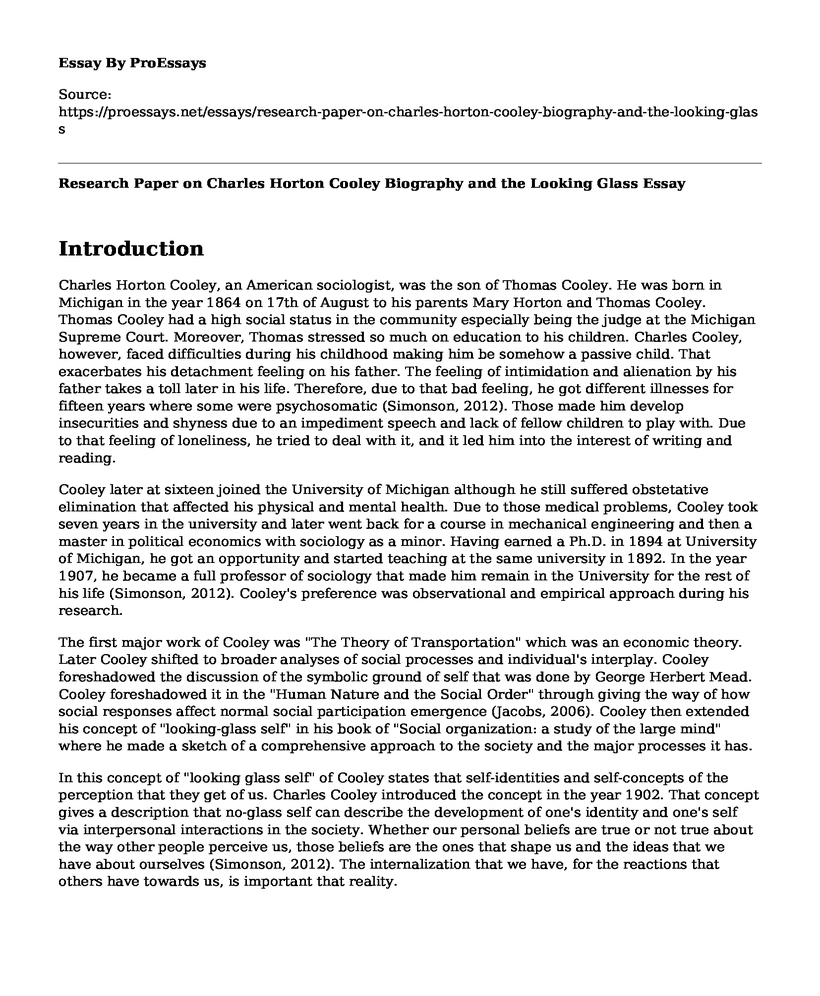Introduction
Charles Horton Cooley, an American sociologist, was the son of Thomas Cooley. He was born in Michigan in the year 1864 on 17th of August to his parents Mary Horton and Thomas Cooley. Thomas Cooley had a high social status in the community especially being the judge at the Michigan Supreme Court. Moreover, Thomas stressed so much on education to his children. Charles Cooley, however, faced difficulties during his childhood making him be somehow a passive child. That exacerbates his detachment feeling on his father. The feeling of intimidation and alienation by his father takes a toll later in his life. Therefore, due to that bad feeling, he got different illnesses for fifteen years where some were psychosomatic (Simonson, 2012). Those made him develop insecurities and shyness due to an impediment speech and lack of fellow children to play with. Due to that feeling of loneliness, he tried to deal with it, and it led him into the interest of writing and reading.
Cooley later at sixteen joined the University of Michigan although he still suffered obstetative elimination that affected his physical and mental health. Due to those medical problems, Cooley took seven years in the university and later went back for a course in mechanical engineering and then a master in political economics with sociology as a minor. Having earned a Ph.D. in 1894 at University of Michigan, he got an opportunity and started teaching at the same university in 1892. In the year 1907, he became a full professor of sociology that made him remain in the University for the rest of his life (Simonson, 2012). Cooley's preference was observational and empirical approach during his research.
The first major work of Cooley was "The Theory of Transportation" which was an economic theory. Later Cooley shifted to broader analyses of social processes and individual's interplay. Cooley foreshadowed the discussion of the symbolic ground of self that was done by George Herbert Mead. Cooley foreshadowed it in the "Human Nature and the Social Order" through giving the way of how social responses affect normal social participation emergence (Jacobs, 2006). Cooley then extended his concept of "looking-glass self" in his book of "Social organization: a study of the large mind" where he made a sketch of a comprehensive approach to the society and the major processes it has.
In this concept of "looking glass self" of Cooley states that self-identities and self-concepts of the perception that they get of us. Charles Cooley introduced the concept in the year 1902. That concept gives a description that no-glass self can describe the development of one's identity and one's self via interpersonal interactions in the society. Whether our personal beliefs are true or not true about the way other people perceive us, those beliefs are the ones that shape us and the ideas that we have about ourselves (Simonson, 2012). The internalization that we have, for the reactions that others have towards us, is important that reality.
Conclusion
However, this concept according to Cooley has three components, and it is unique in humans. It is said to start in early stage and continues throughout one's life since there is no time that one will stop modifying themselves unless the social interactions have ceased. The three components of looking-glass self-are: through judging others are what we use to develop our self, we always have an imagination on how to appear to others, and we react and imagine to the feeling that we have on how others judge our appearance (Jacobs, 2006).
References
Jacobs, G. (2006). Charles Horton Cooley: imagining social reality. Univ of Massachusetts Press.Simonson, P. (2012). Charles Horton Cooley and the Origins of US communication study in political economy. Democratic Communique, 25(1).
Cite this page
Research Paper on Charles Horton Cooley Biography and the Looking Glass. (2022, Apr 01). Retrieved from https://proessays.net/essays/research-paper-on-charles-horton-cooley-biography-and-the-looking-glass
If you are the original author of this essay and no longer wish to have it published on the ProEssays website, please click below to request its removal:
- Paper Example on Women's Peace
- Functional Conflict and Dysfunctional Conflict Essay Example
- Assignment Example on Ethical Issues in Criminal Justice
- Essay Example on Permissive Parenting: Impact on Later Years
- Essay Example on 83-Year-Old Woman's Journey Through Late Adulthood: An Interview
- Essay Example on 1960s African American Resistance: Violent or Nonviolent?
- Essay Example on Teen Magazines: Keeping Teens in the Know!







